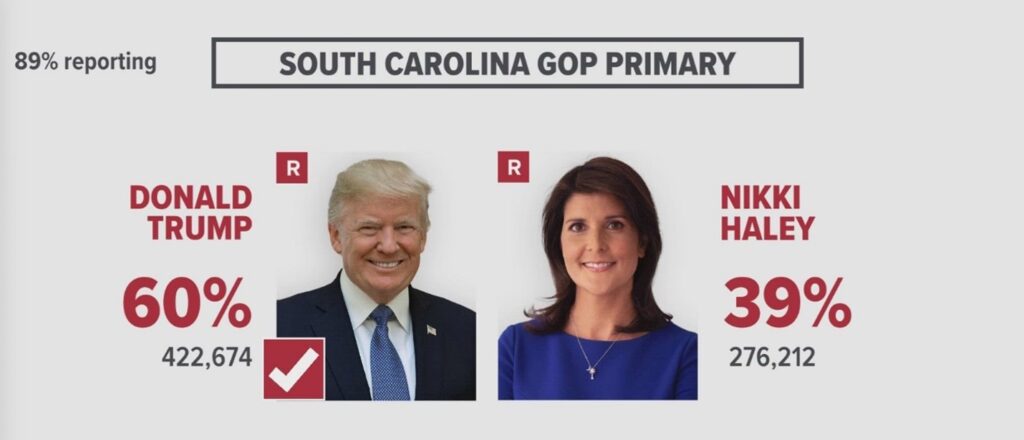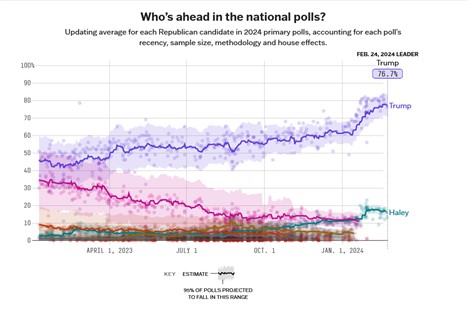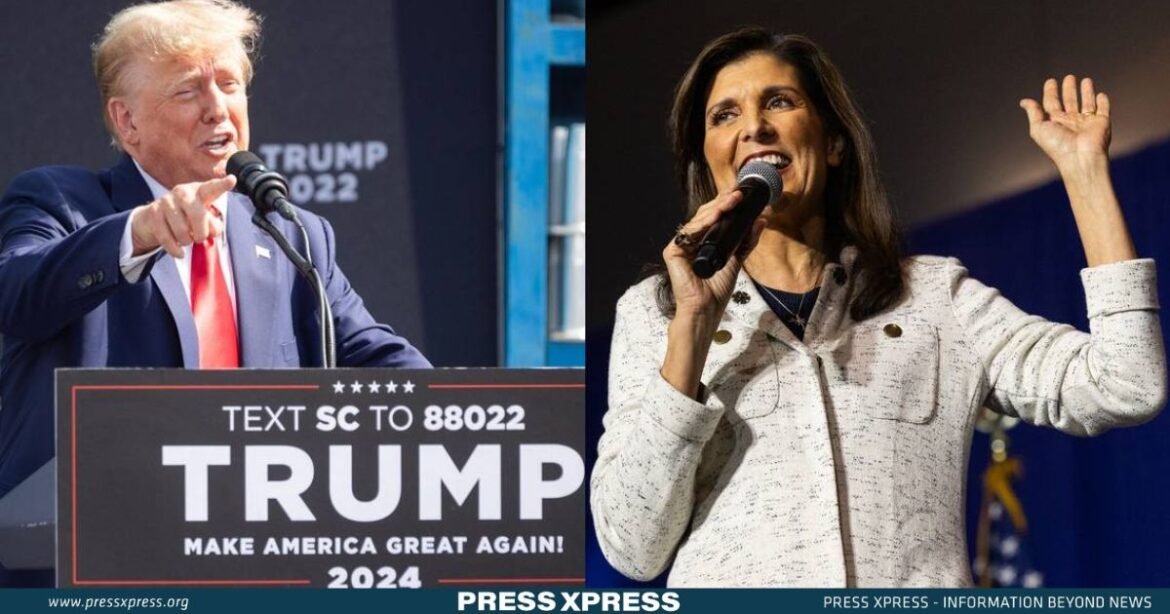Former President Donald Trump scored a decisive victory in the South Carolina Republican primary on Saturday, defeating his closest rival and former UN ambassador Nikki Haley in her home state. The result cements Trump’s status as the frontrunner for the 2024 GOP nomination. Haley, who had hoped to challenge Trump’s dominance in the party, vowed to stay in the race until Super Tuesday, but her chances of stopping Trump’s momentum are slim.

How Trump Beat Every Republican Candidate
Trump’s victory in South Carolina was not surprising, given his strong support among the state’s conservative and evangelical voters. He also had the endorsement of several prominent local politicians, such as Governor Henry McMaster and Representative Nancy Mace.

Trump won 59% of the vote, according to the NBC News projection, while Haley came in second with 13%. Trump’s win in South Carolina follows his previous successes in Iowa, New Hampshire, and Nevada, where he also defeated Haley and other challengers by wide margins. He has amassed a large delegate lead and is on track to secure the nomination by mid-March, unless something dramatic changes.
Factors Behind Trump’s Popularity
Trump’s popularity among Republican voters is driven by several factors, according to political analysts and psychologists. One factor is his appeal to the narrative thinking style, which is characterized by gut reactions, intuition, and personal experience. Trump’s speeches and tweets are often simple, emotional, and anecdotal, rather than complex, rational, and factual. He also uses repetition, slogans, and catchphrases to reinforce his message and create a sense of familiarity and trust.

Another factor is his nationalist and populist rhetoric, which resonates with many Americans who feel disillusioned, disenfranchised, and disrespected by the political establishment, the media, and the elites. Trump portrays himself as a champion of the common people, who are threatened by immigration, trade, globalization, and cultural change. He promises to put America first, to protect its sovereignty, security, and identity, and to restore its economic and military power. He also taps into the grievances, fears, and prejudices of his supporters, and offers them a scapegoat for their problems, such as China, Iran, or the Democrats.
A third factor is his charismatic personality, which attracts many followers who seek a strong and decisive leader, especially in times of crisis and uncertainty. Trump exudes confidence, dominance, and assertiveness, and claims to have the best solutions for every issue. He also cultivates a cult-like devotion among his fans, who see him as a savior, a hero, and a victim of persecution.
Why Trump Might Defeat Biden in 2024
Trump has a strong chance to defeat Biden in the 2024 presidential election, for several reasons. One reason is that Trump still has a loyal and enthusiastic base of supporters, who are likely to turn out in large numbers to vote for him.
Trump also has an advantage in the Electoral College, as he can win the presidency by winning a few key swing states, such as Florida, Pennsylvania, and Wisconsin, even if he loses the popular vote. Biden’s poor handling of the economy, the disastrous withdrawal from Afghanistan, and his liability to formulate a successful strategy in Ukraine have further contributed to Trump’s support.
What the Polls Say
The polls show that the 2024 presidential race is a dead heat, and the Democrats’ are in panic over Trump’s resurgence. According to the latest poll by the Wall Street Journal, Biden and Trump are tied at 46% each, with 8% of voters undecided. The poll also shows that Trump has slightly more support from his base than Biden, with 88% of registered Republicans selecting Trump, versus 83% of Democrats choosing Biden.
The polls also show that Trump leads Biden in some key swing states, such as Arizona, Nevada, and South Carolina, according to a series of polls by Emerson College. In Arizona, Trump leads Biden by 13 points, in Nevada by 6 points, and in South Carolina by 3 points.
Why a Trump Win Might Lead to a Less Interventionist America
If Trump wins the 2024 presidential election, he might pursue a less interventionist foreign policy, in line with his America First doctrine and his isolationist and non-interventionist views. Trump has often criticized the U.S. involvement in foreign wars, alliances, and agreements, and has advocated for reducing the U.S. military presence and spending abroad.
He has also expressed skepticism and hostility toward multilateral institutions, such as the United Nations, NATO, and the World Trade Organization, and has withdrawn the U.S. from several international treaties and organizations, such as the Iran nuclear deal and the Paris climate accord.
A less interventionist America under Trump might have some consequences for the world. It might reduce the risk of war and conflict, especially in the Middle East, where Trump has sought to end the U.S. involvement in Afghanistan, Iraq, and Syria, and to avoid a confrontation with Iran. It might also create more space and opportunities for dialogue and cooperation among other countries, especially in Asia, where Trump has sought to engage with North Korea and to de-escalate the trade war with China.
Conclusion
Trump’s victory in South Carolina is a clear sign of his strength and popularity among Republican voters, and of his likelihood of winning the GOP nomination for the 2024 presidential election. Trump might also have a chance to defeat Biden in the general election, depending on the performance of the Biden administration, the state of the economy and Biden’s own blunders, and the impact of external factors. Trump’s win might also lead to a less interventionist America, which could have positive implications for the world.


